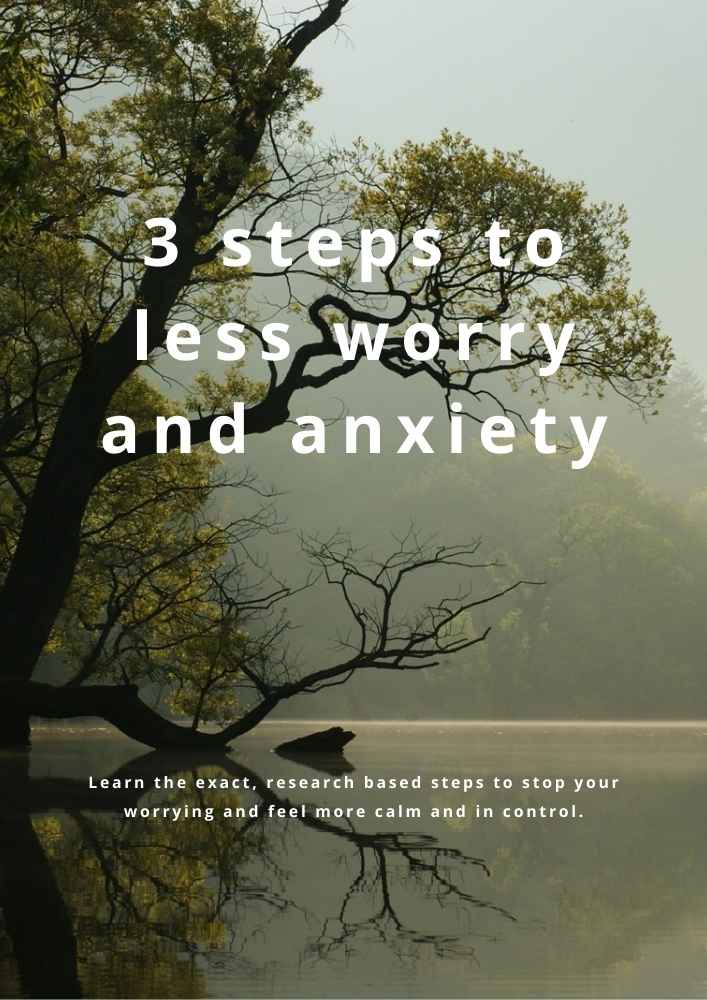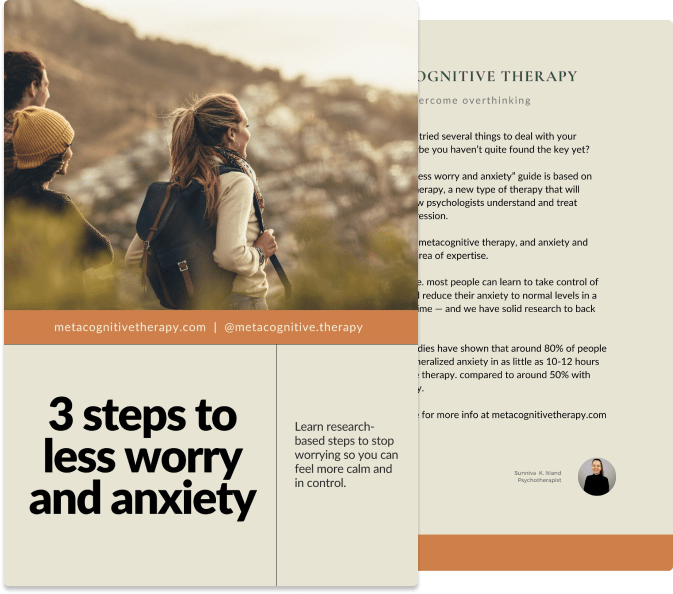5 causes of anxiety and what you can do to get better

Download our best tips on reducing anxiety and worrying
Learn three powerful metacognitive therapy steps to stop the worry cycle, reduce anxiety, and feel calmer in everyday life.


Can you have anxiety for no reason? No. There’s actually always a reason for anxiety — but it might not be what you think. Metacognitive Therapy (MCT) is a new type of psychotherapy that offers a fresh perspective on what causes and sustains your anxiety.
When you feel stuck in a constant state of anxiety, it can be hard to zoom out and find the source of your stress and unease. Even though it might feel like the symptoms are ongoing, it’s possible to recover from anxiety by recognizing the root causes and start responding to your thoughts and symptoms in a more helpful way.
Let's start by looking at the top five most common causes of anxiety:
- You use worrying as a coping strategy.
- You don’t know how to stop worrying (and believe it's out of your control).
- You are constantly paying attention to uncomfortable and scary things (and believe that this is helpful).
- You spend a lot of time analyzing your anxious thoughts and feelings.
- You often try to control or suppress your anxiety.
Some of these might sound like symptoms, but new studies now clearly show that these aren't just symptom—they are behaviours and habits that sustain your anxiety over time. Why is that the case?
1. You use worrying as a coping strategy
Many people use worrying as a way to prepare for possible negative outcomes because they believe it will help them cope or keep them safe. These types of beliefs are also common in people who don't suffer from anxiety, but worrying is still an essential process that is keeping your anxiety going.
It almost never happens that one suffers from anxiety without worrying a lot. A typical response to this statement might sound like: 'But what can I do about it? I can’t just stop worrying about my problems.'
But this is a myth — you actually can!
Studies prove that worrying is a thought process that is very much within our control. It’s just that not everyone knows how to effectively exert that control.
2. You don't know how to stop worrying (and believe it's out of your control).
Once we realize that we are worrying excessively, our natural response is to try to stop it. And to do this, we create our own strategies. But if you're suffering from anxiety, chances are that your current strategies aren't working.
This often leads us to pile on more and more strategies in order to stop worrying (such as meditation, breathing techniques, positive thinking, and avoiding triggers).
When none of these strategies seem to work consistently, the result is that you are left with a sense that your worrying is out of your control. This leads to anxiety for a few different reasons, one of them being because you end up in cycles of repeated negative thinking that you can't seem to stop.
Worrying itself can even start feeling dangerous to you, which leads to worry about worry, and increased anxiety. It can feel like you're about to loose your mind.

Download our best tips on reducing anxiety and worrying
Learn three powerful metacognitive therapy steps to stop the worry cycle, reduce anxiety, and feel calmer in everyday life.
3. You are constantly on high alert for uncomfortable and scary things
Most people who suffer from anxiety are highly attentive to threat. This can manifest in many ways. Here's a few examples of threats that you may be closely monitoring:
- Feelings of unease and symptoms of anxiety (common if you have panic anxiety)
- Bodily symptoms and signs of disease (common if you have health anxiety / hypochondria)
- Signs that other people don’t like you (common if you have social anxiety)
- Threatening people on the street (common if you have been assaulted and have PTSD)
- Nausea (common if you have a fear of vomiting)
And there are, of course, many more. There's a name for this scanning for perceived dangers: threat monitoring. Paying extra attention to things that feel uncomfortable or scary is totally understandable, and many people do this because they believe it will help them pick up warning signs early and keep them safe. But it's rarely helpful… it often just increases your anxiety.
You find more of what you pay attention to. So, when you pay attention to anxiety and discomfort, you'll find more of it.
You can become really good at spotting threats such as symptoms and negative thoughts, causing you to experience more anxiety.
The problem with threat monitoring, is that it prolongs and intensifies your anxiety.
The good news? Threat monitoring is under your control. This means that it is possible to choose a different strategy! You can practice turning your focus away from threats, such as the symptoms you're experiencing, and bringing it towards everyday things. This allows your anxiety to self regulate, and helps you find out that you don’t need to let scary and threatening things take up as much space in your mind.
4. You spend a lot of time analyzing your anxiety
Many who struggle with anxiety think about it and analyze it for hours a day. The goal is typically to identify what triggers increased anxiety, and what determines good VS bad days. It's an understandable line of thinking, but it's also incredibly exhausting and uncomfortable. By paying so much attention to it, you give anxiety more space and power over your life.
So what does this look like? Let's say you wake up with anxiety, and start to wonder, 'Why do I have anxiety today? Did I do something different yesterday?'
Did I:
- Sleep too little?
- Stress too much?
- Overdo something?
Or is it related to my:
- Relationship?
- Childhood?
- Job?
Analyzing your life in this way, searching for answers, is called brooding.
If brooding worked, then you'd probably have less anxiety already. But the opposite is almost always what occurs. You start doubting whether or not your life is how it should be, you get caught up in your worries and become less present in your life. If you spend a lot of time thinking about sad and unpleasant events from the past to explain your anxiety, you might actually start feeling more sad and hopeless.
Brooding is one of the most prevalent reasons for anxiety to turn into depression.
Many people think that if they can find out why they have anxiety, they can get better, though there's little evidence supporting that claim. This is an idea stemming from traditional psychological theories (more than a century old) which appears to not hold water.
It is a myth that anxiety can be cured by an improved understanding of yourself, a sudden insight, or through discovering memories from your childhood.
What will actually reduce your anxiety is engaging less with your anxious thoughts, and showing up more actively in your life, and by seeing thoughts and emotions as passing events in your mind that you don't have to engage with.
5. You often try to control or suppress your anxiety
You've probably been told that you should find ways to lessen your anxiety, and that you can get rid of your anxiety through changing your habits.
You might have heard that the following will help:
- Working out more
- Drinking less coffee
- Sleeping better
- Living a calmer life
- Doing breathing exercises
This is only partially true. You can reduce your anxiety temporarily with the help of breathing exercises, working out, and similar actions. However, in many cases, these strategies are just bandaids that can ultimately maintain or increase anxiety in the long term. Why is that?
When you try to diminish your anxiety, you rob yourself of the opportunity to self-regulate naturally, and you give your brain the message that anxiety is dangerous. Your brain has evolved to avoid danger, so it will try to alert you more to symptoms of anxiety and prompt you to be fearful of them. This then becomes a vicious cycle. You become more anxious about your own anxiety.
When you start designing your daily life around lessening your anxiety, you let your anxiety to control what you can and cannot do. Many find that daily tasks, like taking the bus, making calls, or going to the grocery store, become daunting.
If you notice that you are starting to increasingly avoid certain things, it's time to break this cycle.
So, how do you actually recover from anxiety?
The key to recovering from anxiety is engaging less with your thoughts and more in your life. The best way to achieve this? Do the opposite of what causes and maintains anxiety:
- Don't use worrying as a coping strategy.
- Spend less time analyzing your anxiety.
- Don't fixate your attention on what makes you anxious.
- Let symptoms come and go without trying to control them or attempting to get rid of the discomfort.
- Don’t let your anxiety decide what you should or should not do. You decide!
Test this for yourself, and hopefully you'll notice that anxiety starts taking up less space in your head — and in your life. You can read more about what's keeping your anxiety going and what you can do about it in this article.





